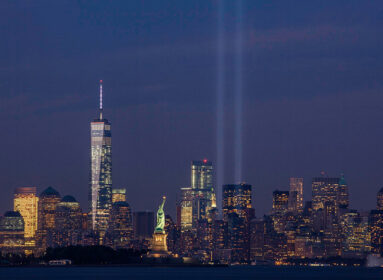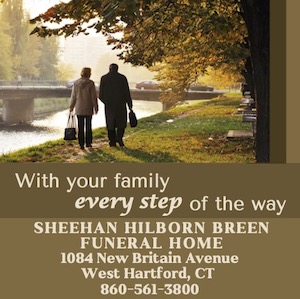By Cindy Mindell
WEST HARTFORD – Every year for the past decade, Beth El Temple in West Hartford has designed a special Sunday afternoon program to honor the community’s Jewish war veterans.
As Veterans Day coincides with the 75th anniversary of Kristallnacht, the service will also commemorate what many historians consider the beginning of the Holocaust. This year’s program is a collaboration with Congregation B’nai Tikvoh-Sholom in Bloomfield. As always, it is hosted by Beth El’s Chai Society, a group of older Beth El members. The program will be held on Sunday, Nov. 10 and is co-hosted by B’nai Tikvoh-Sholom.
Begun in 2004, says Chai Society President Roz Rachlin, in 2005 Chai Society organizers chose to recognize World War II veterans at a Friday night service that fell on Veterans Day. Eighty veterans stood and were recognized during the service. It was so successful, Rachlin says, that Chai Society decided to honor veterans from all wars and the Israel Defense Force the following year, making the Veterans Day service an annual tradition.
Veterans Day and Kristallnacht last coincided in 2007. That year, Beth El’s cantor, Joseph Ness, suggested adding a special musical component to the Friday night program. In 2008, to mark the 70th anniversary of Kristallnacht, Ness incorporated music composed and performed in the Terezin concentration camp. This year, the program will include a similar repertoire.
For the Kristallnacht component, Rachlin approached fellow Beth El board member and past president Bernie Selig, unaware that he had escaped Germany as a child with his family in the wake of Kristallnacht. “I was three at the time, with no direct memory of the experience except for what my father told me,” says Selig, who agreed to share his family’s story.
Selig lived with his sister and parents in Miltenberg am Mainz, above the dry-goods store owned and run by his parents. On the night of Kristallnacht, the store was vandalized and looted. “My father was reasonably well-to-do, ensconced in the town, had served in the German army in World War I, and felt that he was a good German,” Selig says. “He wasn’t religious, though my mother was, and it was unthinkable that he should leave Germany because he was so embedded in it.”
But the attack changed his mind. He sent his wife and children on the train to Le Havre, France, where he later joined them and secured visas to join family in Brooklyn, N.Y.
“In a way, Kristallnacht saved my life,” says Selig, who moved to West Hartford in 1965 with his wife and two children. He still has dishes and silverware from his childhood home, and linens from the dry-goods store, some still bearing stains from the Nazi raid. Other family members made it out of Germany, settling in Montevideo, Uruguay.
Beth El congregant and Holocaust survivor Abby Weiner will also speak at the Beth El commemoration. His talk will center on the history and causes of Kristallnacht. Born in Sighet, Transylvania (later Romania), Weiner was a neighbor of Elie Wiesel, and the two families were among the last Jews transported from the Sighet ghetto to Auschwitz in May 1944. Weiner and Wiesel would meet up again in Buchenwald concentration camp when it was liberated by the U.S. Army in April 1945. After the war, Weiner lived in Germany before making his way to England, where he lived until immigrating to the U.S. in 1948. He served in the Korean War and married in 1962.
Weiner and his wife Bonnie moved to West Hartford from Elmsford, N.Y. in 2009 to be closer to their daughter. “Hitler tried to annihilate the Jews, and the best proof that he didn’t succeed is when I look at our children and grandchildren,” he says.
The lesson from Kristallnacht, Weiner says, is to be more alert to antisemitism, wherever it manifests. “I say, if you hear something, say something,” he says. “We read in the paper about what’s going on in Europe – the fascist Jobbik party in Hungary went from two percent of the popular vote in 2006 to 17 percent in 2010 – and it’s easy to say, ‘Nothing is going to happen here,’ but we made the same mistake in the 1930s.”
Since his two children, now adults, were students in the Jewish day schools of Westchester, Weiner has told his story in many schools and synagogues. It’s something he does as a gesture of gratitude. “If you escape from terrible circumstances or somebody saved you, you have to be so thankful that you were able to survive,” he says.
Comments? email cindym@jewishledger.com.








 Southern New England Jewish Ledger
Southern New England Jewish Ledger











